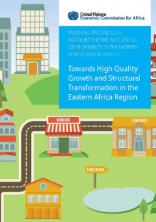Towards High Quality Growth and Structural Transformation in the Eastern Africa Region

ISBN: 978-99944-61-20-2
The report subtitled ‘Towards High Quality Growth and Structural Transformation in the Eastern Africa Region observes that despite the difficult global economic context arising out the 2007/2008 global economic meltdown and financial crisis, the Eastern Africa region continue to highlight the remarkable resilience of the region’s economic growth.
The Tracking Progress Report says however that this strong performance has increasingly been accompanied by growing concerns over the quality of the growth, particularly the extent to which growth has been conducive to broad-based poverty reduction and employment creation. “This is partly due to the size of the population in Eastern Africa that continued to expand rapidly in the 2000s” says Antonio Pedro, Director of the UNECA Sub-Region Office for Eastern Africa.
Although USD 1.25-a-day poverty has been reduced in relative terms in the region (from 65 percent in 2000 to 54 percent of the population in 2011), the absolute number of citizens living below the international poverty line has actually increased, from 155 million to 166 million over the same period.”
The report looks into the reasons why growth has not produced more rapid poverty reduction and improvements in social indicators across the region. Among the reasons investigated in the report, which explain these outcomes, is the relatively sluggish labour markets and the lack of structural change into sectors which produce more jobs.
Another important factor is inequality. Although often not acknowledged, Africa’s income disparities are among the largest in the world, and a number of Eastern African countries are especially badly afflicted by growing levels of inequality. Reductions in inequality can be a powerful tool in enhancing the capacity to reduce poverty. In the case of Rwanda, for example, the report notes that from 2005 to 2011, the country experienced a quite remarkable acceleration in the rate of poverty reduction, which fell from 56.7 percent to 44.9 percent, a 11.8 percent decrease. Part of this is attributed by the Government of Rwanda to a decrease in inequality in over the same period. The report outlines a number of to pro-poor inequality-reducing measures policy measures which could be introduced by governments in the region. “In Africa, regrettably, there are so far few examples of good practices to draw on in terms of reducing inequalities. The first country in the region to do so robustly will clearly win accolades and would deserve to be emulated” the Report notes.
Similarly, an excessive dependence on a limited range of economic activities has in the past undermined economic growth and its capacity to reduce poverty. The UNECA Report analyses the nature of that growth over the last decade. Construction, transport, mining and utilities, and the wholesale and retail sectors have been among the fastest growing in the 2000s. In contrast, across the region the lagging sectors have been agriculture and manufacturing, something which does not bode well in regards to fulfilling ambitions to accelerate ‘structural transformation’. The report discusses some of the policy options, and outlines the experience of some countries in the region, as they try to catalyse the ‘structural transformation’ of their economies.
Finally, while ‘the Tracking Progress Report’ acknowledges that governments across the region have achieved a great deal in terms of improving access to primary education, it argues that a shift in emphasis is now needed. The report makes the case for a new agenda - ‘educational deepening’ – which refers to both an extension of government priorities towards secondary, tertiary and vocational training, and also - quite crucially – a single-minded focus on improving the quality of educational provision. This constitutes one of the most pressing challenges for countries in the region if sustainable growth is to be achieved. Numerous cross-country comparisons are provided to make the case for greater ‘educational deepening’.
As part of this package of policies, good quality demand-driven Technical Vocational Education and Training (TVET) is potentially one of the most important tools for skilling young people, both in and out of school. “Given the shortage of skills in certain sectors of the economy, and the need to align educational systems better to the requirements of the jobs market, tertiary education and TVET should move higher up the agenda of policymakers” states the report.